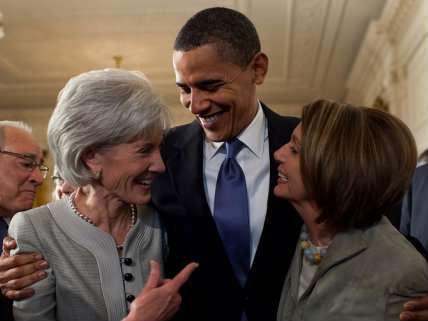How Obamacare Helps Employers Game the System

When big, important laws like Obamacare are first debated and later discussed after passage, you typically hear a lot about what will happen under the law. But fairly often, descriptions of what will happen are actually just descriptions of what someone hopes will happen, or perhaps intends to happen.
For example, think of the law's "employer mandate." Prior to the health law's passage in 2010, and in the years since, we heard quite a bit about what the provision would do. The reality turns out to be somewhat different.
In 2009, for example, President Obama explained that, under the law, "businesses will be required to either offer their workers health care, or chip in to help cover the cost of their workers." Employers, he argued, needed to do their part. "We can't have large businesses and individuals who can afford coverage game the system by avoiding responsibility to themselves or their employees," he said.
In a speech last year, Obama explained the provision again. He also responded to a possible objection about the employer mandate.
"Now, some folks say, well, that's not fair," Obama said. "But if you are an employer, you can afford to provide health insurance, you don't, your employees get sick, they go to the emergency room or they end up on Medicaid because you're not doing what you're doing—you should be doing—why is it everybody else should be bearing those costs?"
That's a good question. Obama might want to dwell on it a little bit further—because, as it turns out, some employers appear to be responding to the mandate by finding ways to enroll employees in Medicaid coverage.
As The Wall Street Journal reports today, benefits consultants are instructing large employers about ways to avoid both penalties for not providing coverage and the cost of coverage itself.
The Medicaid option is drawing particular interest from companies with low-wage workers, brokers say. If an employee qualifies for Medicaid, which is jointly funded by the federal government and the states, the employer pays no penalty for that coverage.
And when that happens, as Obama said, "everybody else" ends up bearing those costs.
…Such maneuvers could fuel controversy. Big employers with significant Medicaid enrollment in their workforces have been a political flash point in some states. The health law aimed to expand Medicaid eligibility to most people with incomes at or below 138% of the federal poverty level, but not all states have adopted that standard.
"We've got to be careful about not fooling ourselves into thinking everybody wins," said Matt Salo, executive director of the National Association of Medicaid Directors. "The cost to the taxpayer does go up significantly."
BeneStream said its business is growing rapidly. "The economics of this are what's driving change," said CEO Ben Geyerhahn. The law "created this as a valid waiver" for employers.
In addition, the Journal reports that employers are also finding ways to offer "skinny" health insurance plans that meet the health law's requirements but offer narrowly limited coverage.
The point is this: Here we have a requirement that was sold on the basis that it would force employers to chip in for worker coverage, that it would keep employers from shifting costs onto taxpayers via Medicaid, and that it would prevent employers from gaming the system. Instead, it is doing the exact opposite of all of these things. The law is creating an opportunity for employers to avoid paying for coverage by shifting them onto Medicaid. It is helping employers game the system.
That's not what was intended to happen. But it's what is actually happening.
